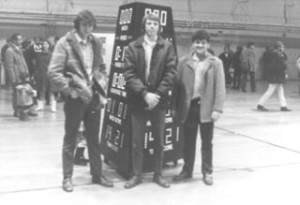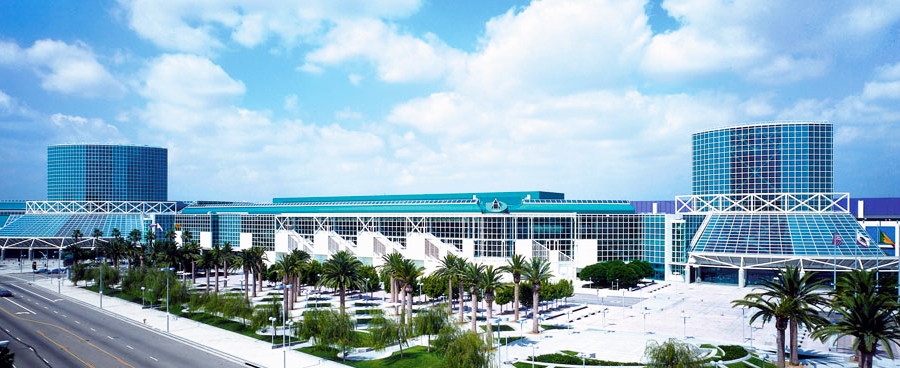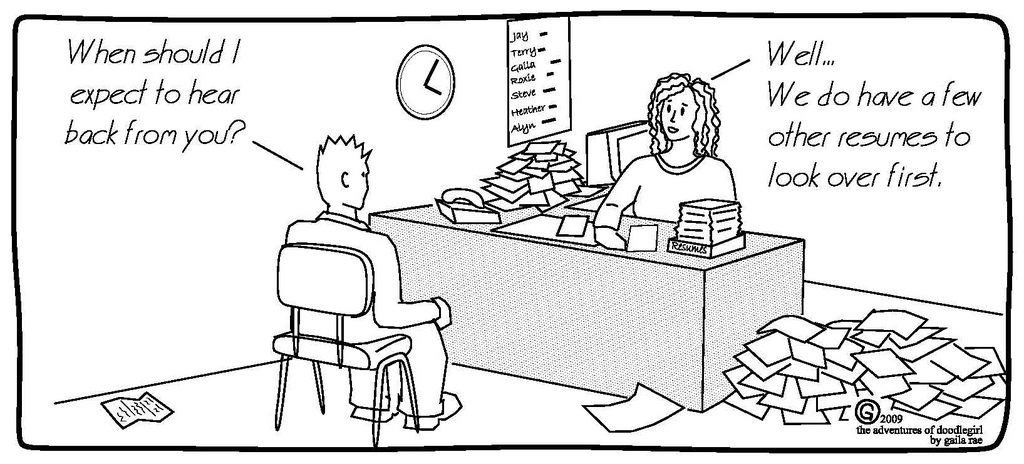The Daktronics Story

Left to Right: Ed Weninger, Jim Morgan, and Brent Berger stand in front of Daktronics’ first Matside three-sided wrestling scoreboard in 1971.
The massive video display over the south end zone at University of Phoenix Stadium, built by Daktronics, was one of the many upgrades made in anticipation of hosting Super Bowl XLIX. Spanning 164ft. across the stadium, it is modern proof of the incredible evolution in scoreboard technology that Daktronics has helped realize since their very first board in 1971.
“As of this year, Daktronics products have been used at all of the past 11 venues to host football’s biggest game,” said Will Ellerbruch, Daktronics national sales manager. “It’s a testament to our product development and services that teams at the professional level of sports select our company to manufacture their displays, and the Arizona Cardinals and University of Phoenix Stadium are no exception. The upgrades to their video display system this season are sure to provide an extra level of excitement at the game on Sunday.”
To tell more of the story, CBS News traveled to Brookings, South Dakota to spotlight the history and people behind the technology:
The Good and Bad of Hierarchy
There are companies experimenting with eliminating hierarchy in their organizations (Zappos is one that immediately comes to mind) in an effort to increase innovation output from all staff levels. It’s a noble cause; however, as with most things in life, a balance needs to be struck in order to find success.
Columbia Business School and INSEAD researchers recently analyzed more than 30,000 Himalayan climbers and 5,000 expeditions over the past 100 years to evaluate the role that hierarchy plays in high-pressure group situations. The researchers suggest that their findings are applicable to a wide variety of industries and not just mountain climbers.
What they found was that a strong hierarchy can increase both summit and fatality rates in the Himalayas. A clear hierarchy helps groups achieve the best outcomes through better organization and coordination and less conflicts during high-pressure situations.
“These processes explain why a strong hierarchy can help expeditions reach the top of the mountain: like the symphonic movement of a beehive, hierarchy helps the group become more than the sum of its parts,” said Roderick Swaab of INSEAD.
The researchers also found that a hierarchy can foster an environment that discourages low-ranking team members from speaking up and sharing valuable information. This could lead to disastrous endings.
“Our findings show that hierarchy can simultaneously improve and undermine group performance,” said Adam Galinsky of the Columbia Business School. “The key to finding the right balance in a hierarchy is identifying the barriers that keep lower-ranking team members from voicing their perspective and providing them with opportunities for empowerment, like owning a task or having authority over a specific initiative. Take surgery teams: the surgeon needs to be in charge to facilitate coordination. But lower-power members of the team also need to be able to speak up. This is why surgery teams put nurses in charge of the all-important check-list of procedures.”
Swaab said that leaders need to set clear norms that facilitate constructive dialogue, because hierarchical values are hard to change once they’re implemented.
“Whether a team is climbing a mountain in the Himalayas or tackling a high-stakes business challenge in the boardroom, it’s critical to leverage the coordination benefits of hierarchy while also embracing an environment that encourages and rewards participation and input from all levels,” said Eric Anicich of the Columbia Business School.
After One Year, Privatization Proves to be the Right Choice for the Los Angeles Convention Center
Privatization of the Los Angeles Convention Center (LACC) has proven to be effective in improving operational efficiency, enhancing building maintenance and aesthetics, and increasing client and attendee satisfaction while saving millions of dollars for the City’s General Fund.
“Converting to a private sector contract to operate the Convention Center was a bold experiment and AEG’s performance has exceeded our highest expectations,” remarked Bud Ovrom, Executive Director of the Los Angeles Department of Convention & Tourism Development, which has management oversight of the AEG Facilities’ contract as well as the Los Angeles Tourism & Convention Board’s (LATCB) contract for marketing and sales.
AEG Facilities improved operational efficiencies, enhancing facility functionality and aesthetics, while reducing the environmental footprint by investing in sustainable products and technology. “We’ve observed a significant investment in preventative building maintenance as well as the completion of numerous projects ranging from painting to washing all the windows to replacing and improving lighting systems throughout the building. Undeniably, these projects have contributed to the positive responses received in the electronic post-show client surveys – the LACC has received an overall rating of 4.5 out of 5. In addition to enhancing the overall maintenance of the facility, we commend AEG for elevating customer service standards and increasing building security,” added Ovrom.
AEG Facilities has also instituted new polices and upgraded amenities to support the LACC’s commitment to excellence by partnering with industry-leading contractors to offer resources and event support to meeting and event planners. AEG 1Source and the LACC negotiated and completed over 30 new contracts with service providers, contractors, and suppliers to reduce costs. “Utilizing the approved-vendor model has allowed the LACC to open up its partnership opportunities and bring in the best talent to support shows and events of all types and sizes held at the venue,” said Ovrom. “AEG has also drastically increased the business inclusion program, exceeding the 20% goal put forth by the City,” concluded Ovrom.
In addition to improved operational efficiencies and upgraded amenities, a notable component of LACC’s success has been the strategic use of technology. “In order to stand-out and compete in our industry we have embraced technology and strengthened our communication channels. The modernization and launch of LACC’s new, user-friendly website and integration of its social media platforms has given the Center a cohesive voice and a consistent presence in the online community. We value engaging with our audience and find these channels to be very effective in our communication strategy. 2015 will continue to bring exciting improvements to the LACC both on and off-line,” commented Jon F. Vein, President, Board of Los Angeles Convention & Tourism Development Commissioners.
Maintaining peaceful labor relations during the transition from public to private management has also contributed to AEG Facilities’ successful management of the LACC. Recently, AEG Facilities successfully completed negotiations with the Los Angeles and Orange Counties Building and Construction Trades Council AFL-CIO, who represent the Convention Center’s electricians, painters, plumbers, and carpenters. “This new partnership between AEG and the Building Trades once again shows that fair and professional labor relations are a strong foundation for success in the City of Los Angeles,” said Ron Miller, Executive Secretary of the Los Angeles/Orange Counties Building and Construction Trades Council, AFL-CIO.
In the realm of finance, transitioning the LACC from a publicly operated facility to private management has been a great success for the City of Angels. According to City records, privatization of the Los Angeles Convention Center had the potential of reducing City General Fund costs by approximately $2M-$6M in the first year. AEG Facilities’ management of the LACC has met the aforementioned goal of improved fiscal responsibility in its first year of operations.
“The convention industry is a huge economic force for Los Angeles and AEG Facilities has collaborated extensively with the LATCB to secure new business for L.A. in just its first year. We look forward to a productive and rewarding year as we work in tandem to attract Citywide Conventions, tradeshows and corporate events in our effort to drive the LACC to a top tier convention destination,” commented Ernest Wooden Jr., President and CEO of LA Tourism.
“The synergy created by the partnership between the City, the LATCB, and AEG Facilities has contributed to the overall success and improvement of the city-owned facility and continued collaboration will propel the LACC to be recognized as an industry leader,” added Jon F. Vein, President, Board of Los Angeles Convention & Tourism Development Commissioners.
AEG Facilities and the City of Los Angeles are proud of the positive achievements privatization has brought to the facility in such a brief period of time. “We look forward to an even better second year,” concluded Brad Gessner, Sr. Vice President & General Manager Los Angeles Convention Center, AEG Facilities.
Photo: EnerGov
Why You Should Always Learn Something New
Sure, doing some crossword and Sudoku puzzles daily may keep your mind sharp, but recent research shows that it’s the learning of a new, mentally challenging skill is what really improves cognitive function.
Researcher Jennifer Lodi-Smith, PhD, from Canisius College in New York and Denise Park from the University of Texas at Dallas’ Center for Vital Longevity randomly assigned 221 adults, ages 60-90, to participate in a specific activity for 15 hours a week over a three-month time period. Some of the adults had to learn a new skill, such as digital photography or quilting.
“At the end of three months, we found that only the group who learned digital photography grew in their memory skills,” Lodi-Smith said.
The adults were not computer savvy and had to remember a series of steps, learn Photoshop, and mount their photos. The key, Lodi-Smith said, is that the group was productively engaged and consistently challenged during their activity.
Other adults in the study filled out crossword puzzles, watched documentaries, and listened to classical music.
“So when we see all these media reports that tell people that they should get involved socially, or do crossword puzzles or Sudoku, they are just not as beneficial as learning something new where you really have to put that effort in,” Lodi-Smith said. “You have to want to change and work hard to see real benefits.”
A Strong “Learning” Attitude Helps You Find a Job Easier
Success depends a lot on your attitude. According to a joint study from the University of Missouri and Lehigh University, job seekers with “learning” attitudes find more success landing their dream jobs.
“Attitude means a lot,” said Daniel Turban, a professor of management at the MU Trulaske College of Business. “In our study, we found that job seekers who have a ‘learning goal orientation’ or a natural disposition to learn from every situation in life, tend to be more successful in achieving their career goals. We also found that this disposition is not just influenced by genetics; it can be acquired.”
Turban and the study’s lead author, Serge da Motta Veiga, surveyed approximately 120 college seniors during different times while in the midst of seeking jobs. They found that those who displayed a strong learning goal orientation (LGO) reacted to failures by putting more effort into the search process, compared to those who had low LGO.
“It’s not that people with a high LGO have less stress, but they deal with the stress better than others,” Turban said. “With the right amount of stress, individuals with a high LGO increased their intensity, and as a result, were more successful with reaching their goals. We always think stress is bad, but that’s not the case. Feeling a moderate amount of stress can be very motivating.”
Turban and da Motta Veiga suggest that people with low LGO can learn behaviors to help them improve their LGO.
“Job seekers can be trained to improve their LGO,” da Motta Veiga said. “Such training could help them realize that the stress and failure they experience while searching for a job is not a bad thing, but instead represents an opportunity to learn from the process and determine how they can be successful at it.”
Do you want to receive a Front Row News weekly digest?
Categories
- Allied (856)
- Architecture (147)
- Arenas (744)
- Career (890)
- Convention Centers (889)
- Education (608)
- Events (1,528)
- Food & Beverage (193)
- Foundation (113)
- Guest Experience (1,482)
- Industry News (2,253)
- Leadership (1,872)
- Marketing (150)
- Membership (1,985)
- Music (212)
- Performing Arts Centers (453)
- Professional Development (398)
- Research (127)
- Safety & Security (425)
- Sports (763)
- Stadiums (607)
- Student (159)
- Technology (515)
- Ticketing (92)
- Touring (82)
- Trends (357)
- Uncategorized (771)
- Universities (216)
- Video (25)
- Young Professional (198)
Twitter Feed
- Twitter feed loading
Recent Posts
- GEODIS Park Selects Allied Universal As Its Preferred Event Services Provider
- Venuworks Appoints Marc Solis as Executive Director of the Fresno Convention and Entertainment Center
- Los Angeles Convention Center Diverts 8,000 Pounds of Wood Waste to Local Foundation Supporting Fire Victims
- Fort Worth Unveils Plans for Phase 2 of Convention Center Transformation
- San Diego Convention Center CEO Announces Retirement After a Decade of Leadership
Categories
- Allied
- Architecture
- Arenas
- Career
- Convention Centers
- Education
- Events
- Food & Beverage
- Foundation
- Guest Experience
- Industry News
- Leadership
- Marketing
- Membership
- Music
- Performing Arts Centers
- Professional Development
- Research
- Safety & Security
- Sports
- Stadiums
- Student
- Technology
- Ticketing
- Touring
- Trends
- Uncategorized
- Universities
- Video
- Young Professional
Archives
- February 2026
- January 2026
- December 2025
- November 2025
- October 2025
- September 2025
- August 2025
- July 2025
- June 2025
- May 2025
- April 2025
- March 2025
- February 2025
- January 2025
- December 2024
- November 2024
- October 2024
- September 2024
- August 2024
- July 2024
- June 2024
- May 2024
- April 2024
- March 2024
- February 2024
- January 2024
- December 2023
- November 2023
- October 2023
- September 2023
- August 2023
- July 2023
- June 2023
- May 2023
- April 2023
- March 2023
- February 2023
- January 2023
- December 2022
- November 2022
- October 2022
- September 2022
- August 2022
- July 2022
- June 2022
- May 2022
- April 2022
- March 2022
- February 2022
- January 2022
- December 2021
- November 2021
- October 2021
- September 2021
- August 2021
- July 2021
- June 2021
- May 2021
- April 2021
- March 2021
- February 2021
- January 2021
- December 2020
- November 2020
- October 2020
- September 2020
- August 2020
- July 2020
- June 2020
- May 2020
- April 2020
- March 2020
- February 2020
- January 2020
- December 2019
- November 2019
- October 2019
- September 2019
- August 2019
- July 2019
- June 2019
- May 2019
- April 2019
- March 2019
- February 2019
- January 2019
- December 2018
- November 2018
- October 2018
- September 2018
- August 2018
- July 2018
- June 2018
- May 2018
- April 2018
- March 2018
- February 2018
- January 2018
- December 2017
- November 2017
- October 2017
- September 2017
- August 2017
- July 2017
- June 2017
- May 2017
- April 2017
- March 2017
- February 2017
- January 2017
- December 2016
- November 2016
- October 2016
- September 2016
- August 2016
- July 2016
- June 2016
- May 2016
- April 2016
- March 2016
- February 2016
- January 2016
- December 2015
- November 2015
- October 2015
- September 2015
- August 2015
- July 2015
- June 2015
- May 2015
- April 2015
- March 2015
- February 2015
- January 2015
- December 2014
- November 2014
- October 2014
- September 2014
- August 2014
- July 2014
- June 2014
- May 2014
- April 2014
- March 2014
- February 2014
- January 2014
- December 2013
- November 2013
- October 2013
- September 2013
- August 2013
- July 2013
- June 2013
- May 2013
- April 2013
- March 2013
- February 2013
- January 2013
- May 2012
- March 2012
- December 2011
- November 2011
- October 2011
Recent Comments
- Frank Bradshaw, Ph.D., CVE on John Meyer, CVE, a Tireless Advocate of Certification for Venue Professionals, Has Died
- Neil Sulkes on Hilary Hartung, Friend to Many in Venue Marketing, Has Left Us
- Jason Parker, CVE on The Devastation of Hurricane Helene and How We Can Support One Another
- Larry Perkins on Touhey Testifies Against Speculative Ticketing Before Congressional Subcommittee
- Peter Secord on Major Players for Planned Elkhart Amphitheater Were in the Mix at VenueConnect




